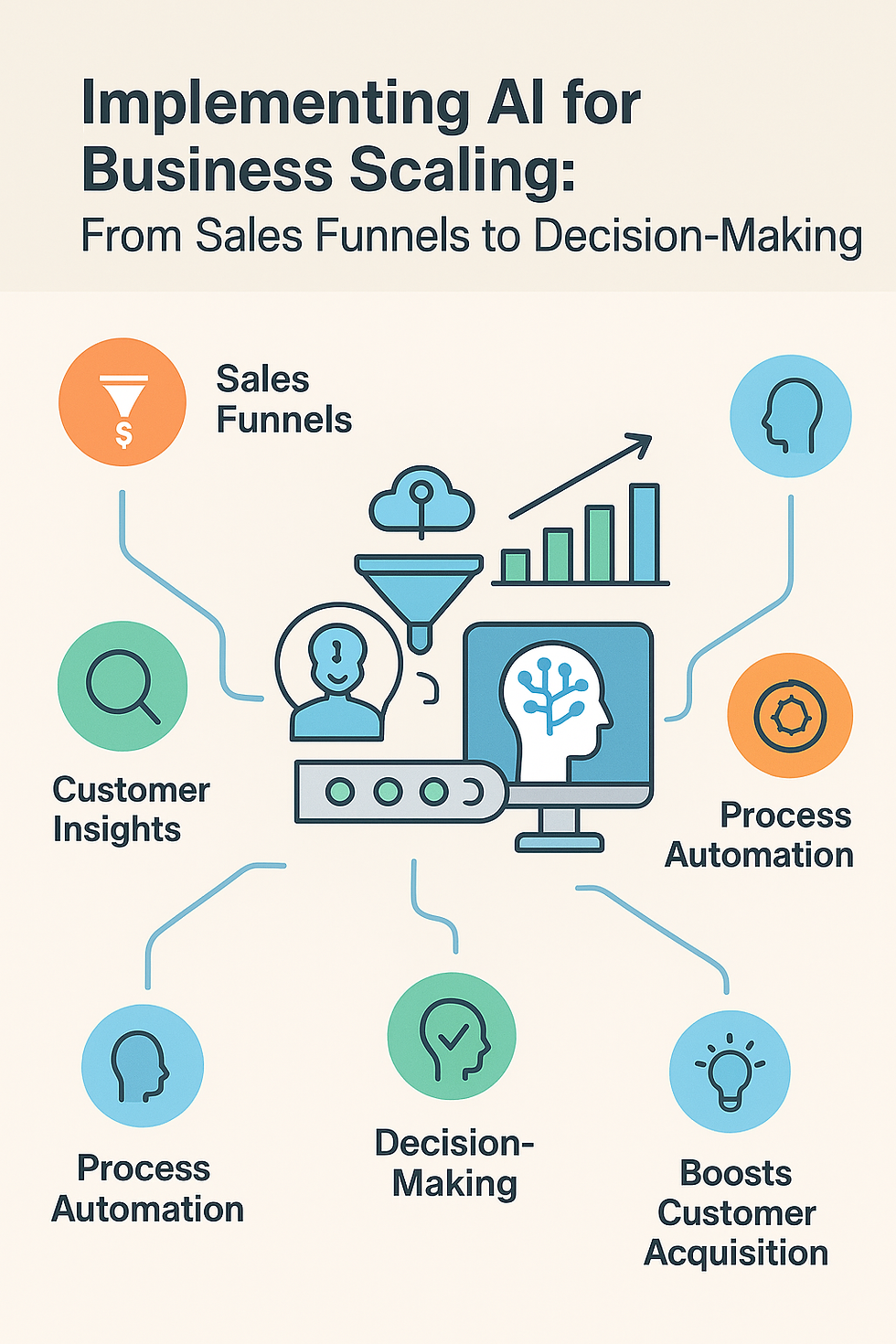Implementing AI for Business Scaling: From Sales Funnels to Decision-Making
- Lakshay Charaya
- Aug 16, 2025
- 3 min read
Updated: Aug 16, 2025

In today’s hyper-competitive market, implementing AI for business scaling is no longer a luxury—it’s a necessity. From optimizing sales funnels to making smarter decisions, AI empowers businesses to grow faster, work smarter, and achieve measurable results. Startups and enterprises alike are discovering that using AI tools for growth not only accelerates revenue but also transforms how they acquire and retain customers.
1: Why Implementing AI for Business Scaling Matters
Artificial Intelligence is more than automation—it’s about precision. By applying machine learning for business revenue, companies can predict customer behavior, personalize offers, and reduce wasted ad spend. This technology allows for:
Data-driven decision-making instead of relying on guesswork.
AI-driven customer acquisition techniques that target the right audience.
Best AI strategies for sales to maximize conversion rates.
According to McKinsey, businesses adopting AI in core processes have reported up to 40% revenue growth within two years.
2: Best AI Strategies for Sales
AI has transformed the sales landscape, allowing teams to work smarter and close more deals in less time. The best AI tools for sales now offer:
Predictive Lead Scoring – Identifying high-value leads automatically.
Personalized Sales Outreach – Crafting tailored messages using customer data.
AI Chatbots for Lead Nurturing – Engaging prospects 24/7.
Sales Funnel Automation – Reducing manual tasks so sales teams focus on closing deals.
Example: Tools like HubSpot AI and Salesforce Einstein are helping businesses personalize sales efforts at scale.
3: AI in Sales Funnel Optimization
Optimizing your sales funnel with AI ensures no lead slips through the cracks. AI in sales funnel optimization works by:
Tracking customer interactions across multiple channels.
Analyzing buying signals to know when to follow up.
Automating drip campaigns to keep leads engaged.
External Resource: HubSpot: AI Sales Strategies (DoFollow link)
4: Using AI Tools for Growth
From marketing automation to operational efficiency, using AI tools for growth allows businesses to scale sustainably. Key benefits include:
Faster Market Analysis – AI scans industry trends in real time.
Operational Cost Reduction – Automation cuts repetitive workload.
Improved Customer Experience – Predictive analytics tailor customer journeys.
Internal Link Suggestion: Link this section to your other blog on “AI Marketing Automation Tips Every Startup Should Know”.
5: AI for Business Decision-Making
Decision-making can make or break a scaling business. AI for business decision-making leverages vast data sets to:
Forecast revenue growth with high accuracy.
Identify market opportunities before competitors.
Simulate different strategies to predict potential outcomes.
Example: Retail giants like Amazon use AI to forecast demand and adjust inventory in real time, improving profitability.
6: Best AI Tools for Sales
Here are some of the best AI tools for sales that can be implemented today:
Tool | Purpose | Pricing Model |
Salesforce Einstein | Predictive lead scoring & insights | Subscription |
HubSpot AI | CRM, sales automation, customer tracking | Freemium |
AI-driven sales engagement | Subscription | |
AI-powered conversation analytics | Subscription |
7: AI-Driven Customer Acquisition Techniques
To acquire customers at scale, AI enables businesses to:
Run hyper-targeted ads using real-time audience data.
Automate lead qualification so sales teams focus on hot leads.
Personalize onboarding experiences to improve retention.
Example: SaaS companies using AI-driven segmentation report 25% higher conversion rates compared to traditional targeting.
8: Steps to Start Implementing AI for Business Scaling
Identify pain points in your current processes.
Choose AI tools that fit your business size and goals.
Integrate AI with existing systems for seamless operation.
Train your team to adapt to AI workflows.
Measure performance metrics and adjust strategies accordingly.
9: The Future of AI in Scaling Businesses
The future points toward fully autonomous sales funnels, predictive decision-making dashboards, and AI assistants capable of running entire campaigns without human input. Businesses that adopt AI early will maintain a competitive edge.
Conclusion
Implementing AI for business scaling is not just about adopting technology—it’s about transforming your business model for sustained growth. From AI in sales funnel optimization to AI for business decision-making, the tools and strategies available today can significantly boost revenue, improve customer acquisition, and ensure your business remains competitive in a rapidly changing market.




Comments